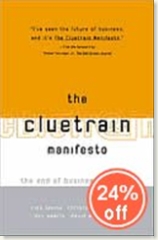David Weinberger, one of the four co-authors of the ClueTrain Manifesto, delivered the opening keynote address at the NewComm Forum this morning in Las Vegas.
His topic: Conversations, blogs, wikipedia and the New Authority. Who gets to be an authority?
 Broadcast is becoming relatively less important in the face of P2P (many to many) communications. Blogs, Wikis, Tags, Consumer generated content.
Broadcast is becoming relatively less important in the face of P2P (many to many) communications. Blogs, Wikis, Tags, Consumer generated content.
User generated content is important. But it’s important for a different reason than has been grabbed onto by a lot of people.
Reality keeps things apart. If you have two things, they must be in their own place and they can’t be in two places at one time. The digital world escapes this constraint.
The characterstics of the digital are not contained by the constraints of the real.
In traditional media, such as the New York Times, there is limited amount of space. Only one front page. And the same front page for everyone who buys the paper.
Take away the constraints of the physical front page and everyone can talk. Everyone can design their own “front page.”
P2P communications are important because they change the basic functions of Control and Authority.
The ancient premise was that the larger the project, the more control you needed. Managers. Managers to manage the managers.
 The Web shows us that this premise is false. The Web is a project of enourmous size. And it has been built with zero managers. It was designed to be built without managers. Because if you needed managers, it would not scale.
The Web shows us that this premise is false. The Web is a project of enourmous size. And it has been built with zero managers. It was designed to be built without managers. Because if you needed managers, it would not scale.
The Web, on its own, is a “permission-free zone.”
Our business world is still at odds with the model of the Web. The infrastructure, culture and attitudes of most businesses are built around the notion of control.
But the Internet is now undermining the walls that companies have put up around themselves.
The industrial revolution turned markets – which had been based on intimate person to person contact – into marketing – which delivered messages to the masses to convince them of their need for mass-produced products.
Of course, there is really no market for messages. Customers don’t want to receive this constant stream of unsolicited messages. And marketers have been constantly at war with their customers.
This is changing. Markets consist of individuals. Individuals with opinions and a voice. And we’re talking to one another. On flickr. On YouTube. Through blogs. By tagging. Through craigslist.
There are values associated with conversation. We get to talk in our real voice. Conversations are open-ended. They are voluntary. It’s about what we’re interested in, not what the marketers are interested in. And they’re not about something else. There should be no hidden agenda.
Weblogs are at the centre of these conversations.
Weblogs show what we care about. And our interests are diverse. Look at Wikipedia, for example. It has listings on more than 1,500,000 different topics. And growing.
Wikipedia tries to organize all information on a topic on a single page. Blogs link the information that appears on an untold number of different pages authored by different people.
Blogging is not journalism. A blog is a blank piece of paper. It only becomes journalism if you write journalism on it. Most people don’t write this way. And their blogs should not be judged by journalistic standards.
Journalism and blogs have developed a relationship. They borrow from one another. But even more significantly, bloggers are asserting their own judgments about what is important. Bloggers have moved into the editorial function.
Some of this is expressed through popularity engines like Digg. And as this model has taken hold, mainstream media have begun to mirror it on their own sites.
And business is beginning to understand that information shared, linked to, mashed up has greater value than in its initial form.
Blogs are written quickly. By ordinary people. And because they are written quickly, the writing may not be up to professional standards. But because we accept the context of immediacy and the fallibility of the blogger, we accept this quality when we read blogs.
Links are an essential element of successful blogging. Every link from one blog to another is a selfless act of generosity. And this spirit drives the blogosphere.
Blogs do not simplify the world. In fact, they make it more complex by bringing forward true diversity. And in doing this, we organize this complexity in patterns that make sense to us.
Organization is authority. So, in taking control of the content, bloggers have taken on authority that previously was held only by organizations.
Take Britannica and Wikipedia. Britannica’s authority was driven by its authoritative writers and editors. Wikipedia’s authority relies on the judgment of its mass readership and contributors. The transparency of its edits to all readers. The trail of edits. And the presence of warnings in the text of Wikipedia articles that specific articles are subject to argument or not sufficiently researched or stubs. All contribute to the confidence that readers can place in Wikipedia. Wikipedia is interested in having us come to informed beliefs.
And, why do we never see these warnings in traditional media? The drive to be infallible. And ultimately, this is a crucial weakness.
Traditional media are “theirs.” P2P media are “ours.” We’ve never had this before.
This notion transcends ownership. Content, participation and attitude trump ownership. Wikipedia is “ours.” Craigslist is “ours.” YouTube is “ours.” Google is “ours.”
The Web is “ours.” We built it for us. And its driving change.
